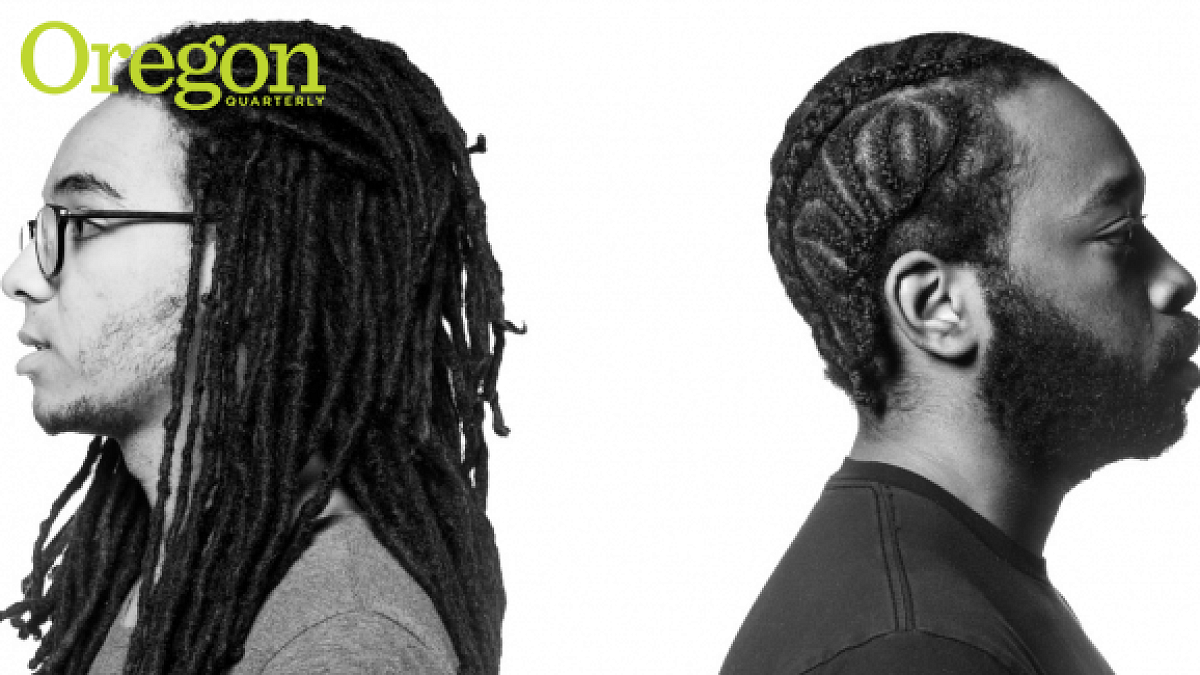A mob of reporters surrounds a dreadlocked athlete, his face smudged with eye black, fresh from the field. They jostle for position, shoving their microphones in his face and shouting increasingly hostile questions, to which he calmly responds. As his patience wears thin, someone in the back yells, "How do you feel about your reputation as a thug?"
The locker room goes silent, and the athlete gives the reporter a long, frustrated look and shakes his head. "I don't have that reputation," he responds. As the barrage of questions begins anew, he pulls his headphones over his ears and turns away, the sound of Aloe Blacc's "The Man" replacing the din of reporters' questions. The ad's tagline appears on the screen: "Hear What You Want."
The athlete is Richard Sherman of the Seattle Seahawks. The headphones are Beats by Dre. The commercial is the work of James Beke and Tyree Harris, two young men less than a year removed from their student days at the University of Oregon.
The two met as UO freshmen. Harris was a rapper and aspiring journalist; Beke made music videos. "We just said, 'Let's team up and make some cool stuff,'" Beke says.
The two are still making "cool stuff." Their first job as a creative team was at advertising agency R/GA in Los Angeles, where they conceived the provocative television ad campaign for Beats by Dre that gained national attention this winter.
Neither foresaw a career in advertising during their early days at the UO. "I was one of those kids who didn't know what he was doing in school," says Beke, who started off studying marketing, switched to sociology, and then tried journalism before figuring out that advertising was the venue that would best allow him to put his creative vision to work. Harris was a journalism major, working at the Oregon Daily Emerald as writer, opinion editor, and eventually, editor-in-chief.
Senior year, the duo traveled to New York and visited advertising agencies as part of the NYC Experience, a program coordinated by Deborah Morrison, Chambers Distinguished Professor of Advertising in the School of Journalism and Communication. In New York, Harris and Beke met with representatives of R/GA, and the agency hired them as a team—Beke as an art director and Harris as a copywriter—to work out of its Los Angeles office.
They started at R/GA shortly after finishing up at UO (Beke still has one credit to go), and their bosses soon asked them to brainstorm ideas for an ad campaign. Having noticed that many professional athletes use music headphones to tune out distractions and focus on their performance, they wrote a script about European soccer players wearing headphones to block out racist chants from hooligans. Beats liked the concept, and asked that it be adapted for American sports.
The tagline "Hear What You Want" seems simple, Harris says, "but there's so much meaning to it. It's an empowering statement."
"All you have to do is worry about yourself and tune outthe haters," Beke adds. "Focus on yourself and don't let people get to you."
The first spot, featuring NBA star Kevin Garnett, aired last fall. A spot featuring San Francisco 49ers quarterback Colin Kaepernick followed. But it was the third spot in the campaign, featuring brash, trash-talking All-Pro cornerback Richard Sherman, that caught fire.
The timing was uncanny. The ad broke just as Sherman delivered a memorable rant after the NFC Championship Game that launched him into the vortex of two weeks of Super Bowl hype. The ad aired again during the pregame Super Bowl broadcast.
The experience of seeing their original concept go from a spec script to a national ad campaign was surreal, Beke says. "The moment it all came crashing down on how insane this is, is when we saw a parody of it on Leno," he says. "I literally couldn't have fathomed it. It doesn't seem real. . . . It touched the culture and people are talking about it."
The experience has been "pretty ridiculous," says Harris. "To work on something that touches millions of eyes . . . it's a crazy feeling."
The two have since switched agencies and are now at BBH Los Angeles, where they are working on a spot that will increase consumer awareness of Google Play (Google's app store). "There was an opportunity for us to take on some projects that are outside of traditional advertising," Harris says. "We loved working on the Beats brand, but we were ready for a new challenge. Making the move now made a lot of sense to where we are heading creatively."
—By Tim Christie


